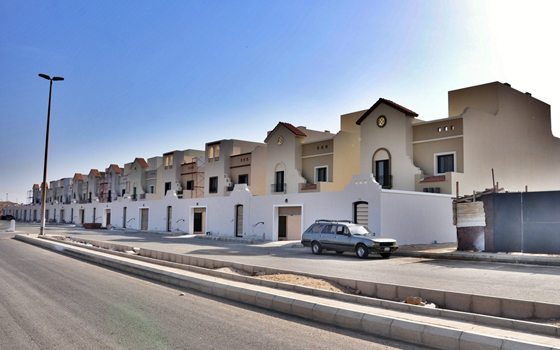Recent measures to levy a tax on empty plots of land in Saudi Arabia are intended to kick-start the residential property sector and tackle the Kingdom’s housing shortage.
The government is targeting so-called white land – undeveloped blocks of property that mark large areas of Saudi Arabia’s cities – by constructing an enhanced regulatory framework for developers as part of the Kingdom’s National Transformation Plan (NTP).
In mid-June the cabinet approved a series of regulations including the implementation of a 2.5% tax on these undeveloped zones for residential or commercial purposes.
Between 40% and 50% of land within Saudi Arabia’s major cities remains vacant, according to local media reports, primarily due to companies and individuals building up land banks that in turn push up prices and lead to speculation.
These new regulations, coupled with government plans to release state-owned land for development, are designed to tackle the housing shortage, lead to a drop in land prices and hopefully improve affordability for middle-income families, which account for more than two-thirds of the population, according to press reports.
Phases of implementation
Though an exact timetable has yet to be set out for the implementation of the tax, indications are that it will be introduced in stages.
The levy will first be imposed on owners of undeveloped plots larger than 10,000 sq meters within certified master planned developments, followed by single owners of similarly sized blocks.
In later stages, single landowners of smaller plots of developed land – land serviced with horizontal infrastructure such as roads and power but no vertical development ¬¬– exceeding 5000 sq meters in the certified master planned developments and single landowners of plots exceeding 10,000 square meters in one city will be subject to the tax.
Industry backs initiative
While broadly welcomed by property developers and brokers, the new land tax is seen as just one step in broadening the home ownership base and encouraging more investment in the residential market.
Further measures and support mechanisms, such as expanded mortgage laws, should be implemented to facilitate the full execution of the new law, according to Mowaffaq Al Hashimi, president of Saqifat Al Safa, a local property developer and real estate management firm.
“The fees on vacant land should accelerate residential housing developments and reinvigorate the market, but like any other regulation, it should be stretched over a reasonable amount of time, rather than hurried throughout the course of a single year,” he told OBG.
Boost to the economy
In addition to increasing the number of housing units, the NTP also aims to broaden the base of the national economy.
One of the NTP’s objectives is to raise the property sector’s contribution to GDP from 5% to 10% and increase the rate of annual growth in the industry from the current level of 4% to 7% by 2020. In line with the plan, the ministry of housing is also aiming to lift the current rate of home ownership from 47% to 52% by 2020.
This would increase the Kingdom’s level of private asset holdings, while government plans to further liberalize access to credit, through providing funding, mortgage solutions and ownership schemes, will also serve to boost the sector.
The Saudi Arabian Monetary Authority (SAMA) has already moved to facilitate access to finance by easing some of its restrictions on loan to value (LTV) on property transactions.
In mid-March SAMA announced an amendment to the LTV ruling, lifting its credit ceiling from 70% to 85% for real estate finance companies, though the lower level remained in force for other lenders.
This should help stimulate purchase activity and have a knock-on effect on the construction sector by making it easier for developers to attain building permits, while also strengthening the position of the real estate finance sector.
If financing is readily available, the objectives set out in the NTP can be achieved, according to Riyad Ahmed Al Thagafi, CEO of real estate at Saudi Arabia-based AWJ Holding, who estimates investments in housing will cost between SR1trn ($266bn) and SR1.5trn ($400bn) over the course of the next 10 years.
“Investment and growth in the residential sector have the capacity to generate employment, with small and medium-sized enterprises being first in line to benefit from the higher level of jobs creation,” Al Thagafi told OBG.
Oxford Business Group
3 August
























































